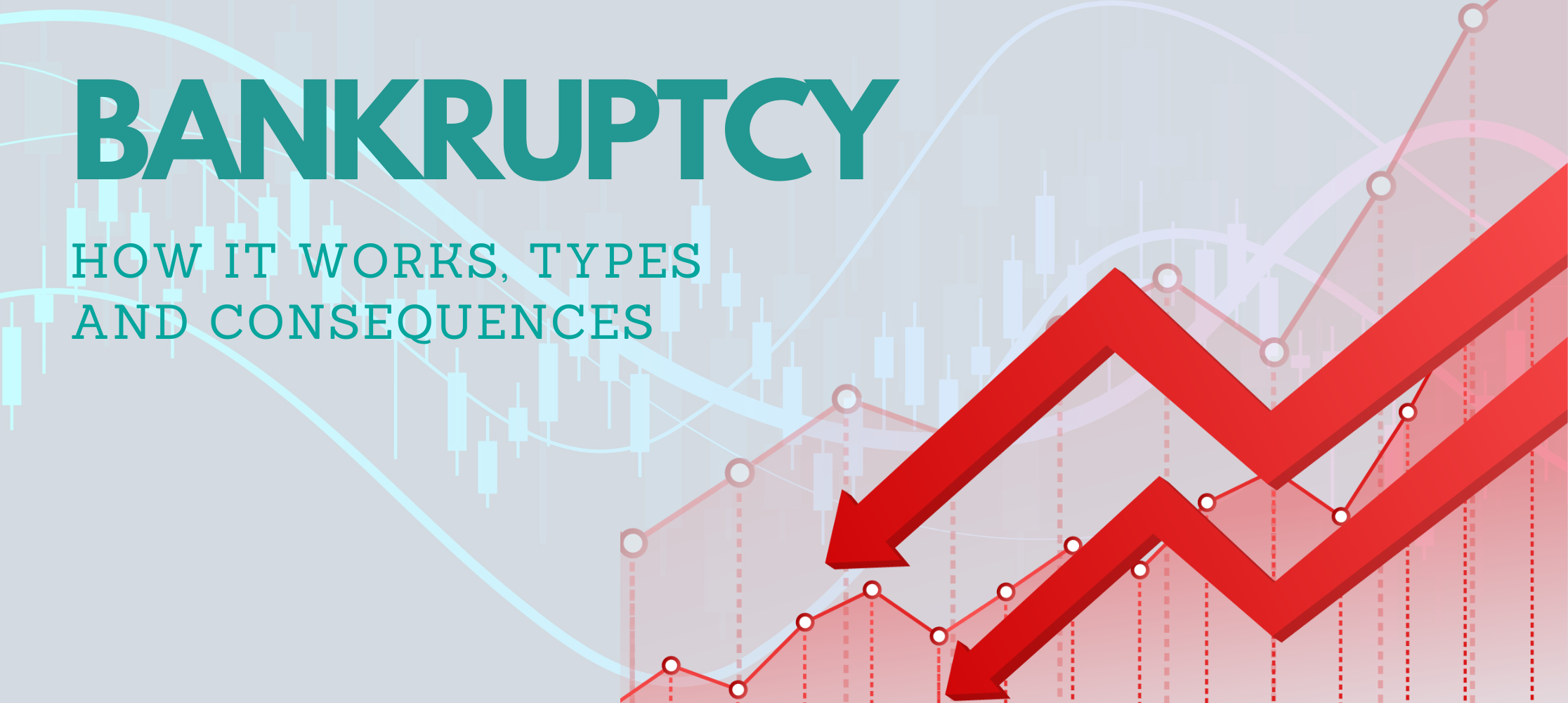How Bankruptcy Works – Types And Consequences

Bankruptcy is a legal process that eliminates all or some portion of the debt that you owe. However, this happens after some stern consequences. Knowing the entire process of filing bankruptcy for credit card debt can help you determine whether the perks are even worth the drawbacks or not. This also includes understanding the various options and their consequences.
If you wish to know more about whether does bankruptcy clear debt, then read on! Below, we have explained in detail everything that you need to know about how bankruptcy works. So, let us get on with it.
How Does Bankruptcy Work?
Bankruptcy helps consumers get relief from debt they cannot afford to repay while also making sure that creditors get some payment on the basis of the borrower’s assets and overall financial situation.
Once you file for credit card debt bankruptcy, your creditors must halt all collection attempts, including things like foreclosure, wage garnishment, and repossession. That being said, only particular types of debt can be included in bankruptcy.
It usually makes sense to list down the help of a bankruptcy attorney who can help you identify what type of bankruptcy is suitable for you. For instance, if you seek help from expert credit score services, such as Gifted Financial Service, they will guide you through the process. Moreover, they can even act as your representative in the proceedings. Now that you have a clear understanding of how bankruptcy works, let us discuss the common types of bankruptcy.
How Bankruptcies Work | Common Types Of Bankruptcy
Based on what type of bankruptcy you opt for – liquidation bankruptcy or reorganization bankruptcy, you might be required to repay a slice of what you owe on the basis of your assets and financial situation. All the remaining debt will be cleared, meaning you no longer have any compulsion to pay it. Let us look into detail the common types of bankruptcy:
Chapter 7 Bankruptcy
Liquidation bankruptcy is also known as straight or Chapter 7 bankruptcy. It also involves selling off some of your assets to pay off what you can and liquidating the rest of your debts. A trustee is assigned by the court to look into your case. They will manage the liquidation of your assets and pay your creditors with the proceeds. Particular assets are exempt, but the amounts and types can differ by state.
You can file bankruptcy for free, but the process generally takes between four and six months from beginning to end. However, keep in mind that not everyone qualifies for Chapter 7 bankruptcy. You will have to pass a means test or meet specific criteria for low income, among other fundamentals.
Chapter 13 Bankruptcy
Reorganization bankruptcy is also known as Chapter 13 bankruptcy. You can restructure your installment loans while in Chapter 13 in a manner that permits you to pay off a slice of what you owe, or it might even pay all of it. It takes about a period of three to five years. You will propose a monthly payment amount on the basis of your financial situation, which your creditors can accept or object to, at which point you might be required to negotiate.
In return for an extended process, reorganization allows you to keep your assets. There is also no test needed for this option, and the length of your rearranged repayment term will be based on your income level. However, you will have to complete particular other requirements prior to filing.
Consequences Of Bankruptcy
If your financial situation is terrible, bankruptcy might be the only way to get all the help that you need. However, there are numerous bankruptcy consequences to think about before you move on with it.
Loss of Property
With Chapter 7 bankruptcy, you need to liquidate some of your assets to repay your creditors. Even with Chapter 13 bankruptcy, you might be required to sell off particular assets to afford your payments. If you include secured debt, such as an auto loan or mortgage loan, in your bankruptcy filing, you can also lose it. So, if you are worried about “if you file for bankruptcy can you keep your house?” then you should know that your vehicle or the house can be used as collateral for the debt.
Credit Damage
If you have a bad credit score, then you must know that your payment history is the most influential factor to improve or damage it. Moreover, filing for bankruptcy means you are unable to pay your debts in full, so your credit score will be affected.
For instance, a Chapter 7 bankruptcy can stay on your credit report for about ten years from the date of filing. On the contrary, it is only seven years for Chapter 13. While the negative effects of bankruptcies can be reduced with time, especially if you are vigilant about rebuilding your credit, it can still be daunting to get approved for affordable credit options for many years after you get your filings discharged.
Impact On Others
If any of your loved ones co-signed one of the loans that you are including in your bankruptcy, they might also be responsible for paying some portion of the debt.
Some Debt May Remain
As mentioned previously, not every debt is included in the bankruptcy filing. While you might get some relief, you might not often get a clean slate.
Pros And Cons Of Bankruptcy
Even though bankruptcy must only be thought of as a last resort, it is not completely a negative step. Read on to find out how does filing for bankruptcy affect you:
Filing For Bankruptcy Pros
- It Puts An End To Collection Efforts: If you are fielding destructive collection calls, you are subject to wage garnishment, or you have been sued for payment, filing for bankruptcy will end all of these activities.
- It Can Offer You The Relief That You Require: If you have bushed all other options, bankruptcy might be the sole way for you to get the financial relief you want. Based on your situation, it can even provide you with a fresh beginning, although with some work ahead of you to rebuild your credit.
- You Can Get A Repayment Plan That Suits You The Most: If you have been ineffective in negotiating a restructured repayment plan with your creditors, bankruptcy might aid you in getting a plan that suits your budget perfectly.
Filing For Bankruptcy Cons
- It Can Ruin Your Credit: Even though bankruptcy can make sense for your financial well-being, it can take many years to rebuild your credit history. Consequently, you might need to put particular financial moves on hold till you get qualified for better terms.
- You Can Even Lose A Portion Of Your Assets: Regardless of what sort of bankruptcy you opt for, you might need to sell off a number of your assets to cover your payments. That revolves around things like jewelry, non-retirement investments, furniture, and more.
- It Is Not A Warranty: Based on your financial situation, there is no warranty that you will be qualified for bankruptcy. Even if you do, you might not get the results you are seeking.
Prior to filing, it is important to think of both the pros and cons of filing bankruptcy and how they may affect your specific condition. Only then can you make the best decision for yourself. You can also seek help from experts at Gifted Financial Services.
Frequently Asked Questions (FAQs)
-
How long does bankruptcies take?
A bankruptcy reduces your credit report after ten years if you file for either type of bankruptcy. As long as it stays on your report, it will be difficult for you to improve your credit score.
-
What can you not do after filing bankruptcies?
After you file for bankruptcy, do your best to reestablish your credit. Moreover, you need to manage your cash efficiently to avoid falling into the same pitfalls that resulted in your bankruptcy.
-
Is declaring bankruptcy possible?
If you choose to go bankrupt, then you will have to work with the LIT to complete the required forms. They will then file your documents with the OSB, and you will be formally declared “bankrupt.”
Summing It All Up!
That is all that you need to know about credit card bankruptcy. It is a legitimate process that permits an individual to discharge various types of debts, start rebuilding their financial lives, and get rid of calls from collection agencies. We suggest that prior to filing for bankruptcy, you should think about consulting experts from credit score monitoring services, such as Gifted Financial Services, to explore more options.



